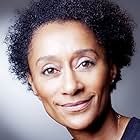The first series was revealing and honest about a deprived childhood and the devastating consequences on the aspirations and achievements of that misfortune. It realistically portrays the shame and guilt that can accrue. But all this is done with humour - both ribald and acerbic - that still remains both humane and ultimately hopeful, despite the pent-up frustrations of teenage angst and a quiet rage against the circumstances of life inflicted on protagonist Bethan.
The portrait of Bethan's mam going through an episode of bipolar breakdown is eviscerating - but then again, there is healing and resolution, if only for a while. The mainly female leads in the first and second series are outstanding - Creevey playing Bethan is, as they say, a revelation and the actress playing her mam delivers a tour de force. Rhodri Meilyr, Steffan Rhodri and Mr Wilbraham playing Travis also provide terrific support, as do the young actresses playing Ffion and Bethan's girlfriend (apologies to all actors unnamed - I can't see the crew listing to check your names as I write).
The second series is a wonderful sequence - the actors, their characters and the storyline have all matured. This is a story that needed to be told and it is told engagingly. It could be argued that such stories never end happily or hopefully. But I know from experience (and I think the author has also lived this) that it is possible, especially with the kindness and support of teachers, to escape the seemingly inevitable failure meted out to the 'undeserving' poor. This film may be frank and challenging and even uncomfortable to view at times - but it is both rewarding and entertaining.
I see some anti-Welsh racists in comments have bemoaned the mere existence of Welsh culture and voices - all the more reason to resist such xenophobia and do the opposite. More productions of quality like this from Wales (and other cultures outside the English metropolitan elites) and more presence of the Welsh language are now due. It's time that UK television reflected that English has not 'extirped' Welsh and that it is a modern, European indigenous language with its finger on the pulse of what really matters today and a significant presence in the UK.

































